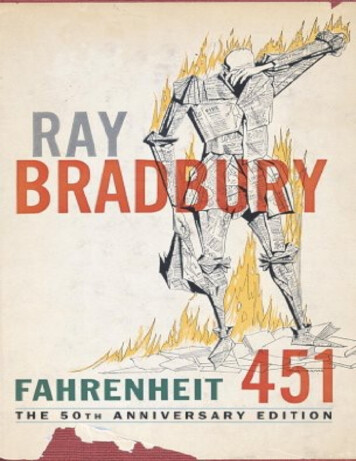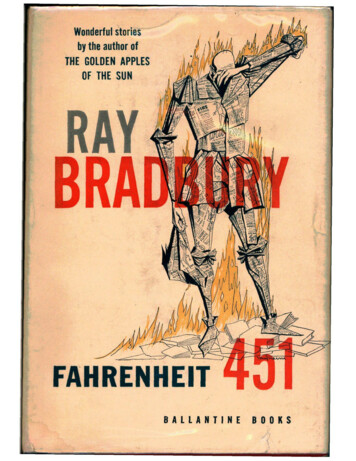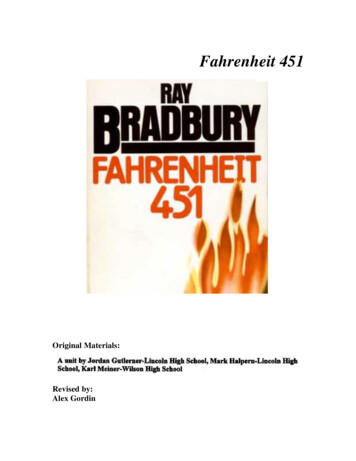
Transcription
RAY BRADBURYFAHRENHEIT 451This one, with gratitude, is for DON CONGDON.FAHRENHEIT 451:The temperature at which book-paper catches fire and burns PART IIT WAS A PLEASURE TO BURNIT was a special pleasure to see things eaten, to see things blackened andchanged.With the brass nozzle in his fists, with this great python spitting itsvenomous kerosene upon the world, the blood pounded in his head, and hishands were the hands of some amazing conductor playing all thesymphonies of blazing and burning to bring down the tatters and charcoalruins of history. With his symbolic helmet numbered 451 on his stolid head,and his eyes all orange flame with the thought of what came next, he flickedthe igniter and the house jumped up in a gorging fire that burned theevening sky red and yellow and black. He strode in a swarm of fireflies.He wanted above all, like the old joke, to shove a marshmallow on a stick inthe furnace, while the flapping pigeon-winged books died on the porch andlawn of the house. While the books went up in sparkling whirls and blewaway on a wind turned dark with burning.Montag grinned the fierce grin of all men singed and driven back by flame.He knew that when he returned to the firehouse, he might wink at himself, aminstrel man, burnt-corked, in the mirror. Later, going to sleep, he wouldfeel the fiery smile still gripped by his face muscles, in the dark. It neverwent away, that. smile, it never ever went away, as long as he remembered.
He hung up his black-beetle-coloured helmet and shined it, he hung hisflameproof jacket neatly; he showered luxuriously, and then, whistling,hands in pockets, walked across the upper floor of the fire station and felldown the hole. At the last moment, when disaster seemed positive, hepulled his hands from his pockets and broke his fall by grasping the goldenpole. He slid to a squeaking halt, the heels one inch from the concrete floordownstairs.He walked out of the fire station and along the midnight street toward thesubway where the silent, air-propelled train slid soundlessly down itslubricated flue in the earth and let him out with a great puff of warm air anto the cream-tiled escalator rising to the suburb.Whistling, he let the escalator waft him into the still night air. He walkedtoward the comer, thinking little at all about nothing in particular. Before hereached the corner, however, he slowed as if a wind had sprung up fromnowhere, as if someone had called his name.The last few nights he had had the most uncertain feelings about thesidewalk just around the corner here, moving in the starlight toward hishouse. He had felt that a moment before his making the turn, someone hadbeen there. The air seemed charged with a special calm as if someone hadwaited there, quietly, and only a moment before he came, simply turned to ashadow and let him through. Perhaps his nose detected a faint perfume,perhaps the skin on the backs of his hands, on his face, felt the temperaturerise at this one spot where a person's standing might raise the immediateatmosphere ten degrees for an instant. There was no understanding it.Each time he made the turn, he saw only the white, unused, bucklingsidewalk, with perhaps, on one night, something vanishing swiftly across alawn before he could focus his eyes or speak.But now, tonight, he slowed almost to a stop. His inner mind, reaching outto turn the corner for him, had heard the faintest whisper. Breathing? Orwas the atmosphere compressed merely by someone standing very quietlythere, waiting?
He turned the corner.The autumn leaves blew over the moonlit pavement in such a way as tomake the girl who was moving there seem fixed to a sliding walk, lettingthe motion of the wind and the leaves carry her forward. Her head was halfbent to watch her shoes stir the circling leaves. Her face was slender andmilk-white, and in it was a kind of gentle hunger that touched overeverything with tireless curiosity. It was a look, almost, of pale surprise; thedark eyes were so fixed to the world that no move escaped them.Her dress was white and it whispered. He almost thought he heard themotion of her hands as she walked, and the infinitely small sound now, thewhite stir of her face turning when she discovered she was a moment awayfrom a man who stood in the middle of the pavement waiting.The trees overhead made a great sound of letting down their dry rain. Thegirl stopped and looked as if she might pull back in surprise, but insteadstood regarding Montag with eyes so dark and shining and alive, that he felthe had said something quite wonderful. But he knew his mouth had onlymoved to say hello, and then when she seemed hypnotized by thesalamander on his arm and the phoenix-disc on his chest, he spoke again."Of course," he said, "you're a new neighbour, aren't you?""And you must be"-she raised her eyes from his professional symbols-"thefireman."Her voice trailed off."How oddly you say that.""I'd-I'd have known it with my eyes shut," she said, slowly."What-the smell of kerosene? My wife always complains," he laughed."You never wash it off completely.""No, you don't," she said, in awe.
He felt she was walking in a circle about him, turning him end for end,shaking him quietly, and emptying his pockets, without once movingherself."Kerosene," he said, because the silence had lengthened, "is nothing butperfume to me.""Does it seem like that, really?""Of course. Why not?"She gave herself time to think of it. "I don't know." She turned to face thesidewalk going toward their homes. "Do you mind if I walk back with you?I'm Clarisse McClellan.""Clarisse. Guy Montag. Come along. What are you doing out so latewandering around? How old are you?"They walked in the warm-cool blowing night on the silvered pavement andthere was the faintest breath of fresh apricots and strawberries in the air, andhe looked around and realized this was quite impossible, so late in the year.There was only the girl walking with him now, her face bright as snow inthe moonlight, and he knew she was working his questions around, seekingthe best answers she could possibly give."Well," she said, "I'm seventeen and I'm crazy. My uncle says the twoalways go together. When people ask your age, he said, always sayseventeen and insane.Isn't this a nice time of night to walk? I like to smell things and look atthings, and sometimes stay up all night, walking, and watch the sun rise."They walked on again in silence and finally she said, thoughtfully, "Youknow, I'm not afraid of you at all."He was surprised. "Why should you be?"
"So many people are. Afraid of firemen, I mean. But you're just a man, afterall."He saw himself in her eyes, suspended in two shining drops of bright water,himself dark and tiny, in fine detail, the lines about his mouth, everythingthere, as if her eyes were two miraculous bits of violet amber that mightcapture and hold him intact. Her face, turned to him now, was fragile milkcrystal with a soft and constant light in it. It was not the hysterical light ofelectricity but-what? But the strangely comfortable and rare and gentlyflattering light of the candle. One time, when he was a child, in a powerfailure, his mother had found and lit a last candle and there had been a briefhour of rediscovery, of such illumination that space lost its vast dimensionsand drew comfortably around them, and they, mother and son, alone,transformed, hoping that the power might not come on again too soon .And then Clarisse McClellan said:"Do you mind if I ask? How long have you worked at being a fireman?""Since I was twenty, ten years ago.""Do you ever read any of the books you bum?"He laughed. "That's against the law!""Oh. Of course.""It's fine work. Monday bum Millay, Wednesday Whitman, FridayFaulkner, burn 'em to ashes, then bum the ashes. That's our official slogan."They walked still further and the girl said, "Is it true that long ago firemenput fires out instead of going to start them?""No. Houses. have always been fireproof, take my word for it.""Strange. I heard once that a long time ago houses used to burn by accidentand they needed firemen to stop the flames."
He laughed.She glanced quickly over. "Why are you laughing?""I don't know." He started to laugh again and stopped "Why?""You laugh when I haven't been funny and you answer right off. You neverstop to think what I've asked you."He stopped walking, "You are an odd one," he said, looking at her. "Haven'tyou any respect?""I don't mean to be insulting. It's just, I love to watch people too much, Iguess.""Well, doesn't this mean anything to you?" He tapped the numerals 451stitched on his char-coloured sleeve."Yes," she whispered. She increased her pace. "Have you ever watched thejet cars racing on the boulevards down that way?"You're changing the subject!""I sometimes think drivers don't know what grass is, or flowers, becausethey never see them slowly," she said. "If you showed a driver a green blur,Oh yes! he'd say, that's grass! A pink blur? That's a rose-garden! Whiteblurs are houses. Brown blurs are cows. My uncle drove slowly on ahighway once. He drove forty miles an hour and they jailed him for twodays. Isn't that funny, and sad, too?""You think too many things," said Montag, uneasily."I rarely watch the 'parlour walls' or go to races or Fun Parks. So I've lots oftime for crazy thoughts, I guess. Have you seen the two-hundred-foot-longbillboards in the country beyond town? Did you know that once billboardswere only twenty feet long?
But cars started rushing by so quickly they had to stretch the advertising outso it would last.""I didn't know that!" Montag laughed abruptly."Bet I know something else you don't. There's dew on the grass in themorning."He suddenly couldn't remember if he had known this or not, and it madehim quite irritable."And if you look"-she nodded at the sky-"there's a man in the moon."He hadn't looked for a long time.They walked the rest of the way in silence, hers thoughtful, his a kind ofclenching and uncomfortable silence in which he shot her accusing glances.When they reached her house all its lights were blazing."What's going on?" Montag had rarely seen that many house lights."Oh, just my mother and father and uncle sitting around, talking. It's likebeing a pedestrian, only rarer. My uncle was arrested another time-did I tellyou?-for being a pedestrian. Oh, we're most peculiar.""But what do you talk about?"She laughed at this. "Good night!" She started up her walk. Then sheseemed to remember something and came back to look at him with wonderand curiosity. "Are you happy?" she said."Am I what?" he cried.But she was gone-running in the moonlight. Her front door shut gently."Happy! Of all the nonsense."He stopped laughing.
He put his hand into the glove-hole of his front door and let it know histouch. The front door slid open.Of course I'm happy. What does she think? I'm not? he asked the quietrooms. He stood looking up at the ventilator grille in the hall and suddenlyremembered that something lay hidden behind the grille, something thatseemed to peer down at him now. He moved his eyes quickly away.What a strange meeting on a strange night. He remembered nothing like itsave one afternoon a year ago when he had met an old man in the park andthey had talked .Montag shook his head. He looked at a blank wall. The girl's face was there,really quite beautiful in memory: astonishing, in fact. She had a very thinface like the dial of a small clock seen faintly in a dark room in the middleof a night when you waken to see the time and see the clock telling you thehour and the minute and the second, with a white silence and a glowing, allcertainty and knowing what it has to tell of the night passing swiftly ontoward further darknesses but moving also toward a new sun."What?" asked Montag of that other self, the subconscious idiot that ranbabbling at times, quite independent of will, habit, and conscience.He glanced back at the wall. How like a mirror, too, her face. Impossible;for how many people did you know that refracted your own light to you?People were more often-he searched for a simile, found one in his worktorches, blazing away until they whiffed out. How rarely did other people'sfaces take of you and throw back to you your own expression, your owninnermost trembling thought?What incredible power of identification the girl had; she was like the eagerwatcher of a marionette show, anticipating each flicker of an eyelid, eachgesture of his hand, each flick of a finger, the moment before it began. Howlong had they walked together? Three minutes? Five? Yet how large thattime seemed now. How immense a figure she was on the stage before him;what a shadow she threw on the wall with her slender body! He felt that if
his eye itched, she might blink. And if the muscles of his jaws stretchedimperceptibly, she would yawn long before he would.Why, he thought, now that I think of it, she almost seemed to be waiting forme there, in the street, so damned late at night . .He opened the bedroom door.It was like coming into the cold marbled room of a mausoleum after themoon had set. Complete darkness, not a hint of the silver world outside, thewindows tightly shut, the chamber a tomb-world where no sound from thegreat city could penetrate.The room was not empty.He listened.The little mosquito-delicate dancing hum in the air, the electrical murmur ofa hidden wasp snug in its special pink warm nest. The music was almostloud enough so he could follow the tune.He felt his smile slide away, melt, fold over, and down on itself like a tallowskin, like the stuff of a fantastic candle burning too long and now collapsingand now blown out. Darkness. He was not happy. He was not happy. Hesaid the words to himself.He recognized this as the true state of affairs. He wore his happiness like amask and the girl had run off across the lawn with the mask and there wasno way of going to knock on her door and ask for it back.Without turning on th
FAHRENHEIT 451: The temperature at which book-paper catches fire and burns PART I IT WAS A PLEASURE TO BURN IT was a special pleasure to see things eaten, to see things blackened and changed. With the brass nozzle in his fists, with this great python spitting its venomous keros ene upon the wo rld, the blood pounded in his head, and his hands w ere the hands of so me amazing File Size: 651KBPage Count: 163











